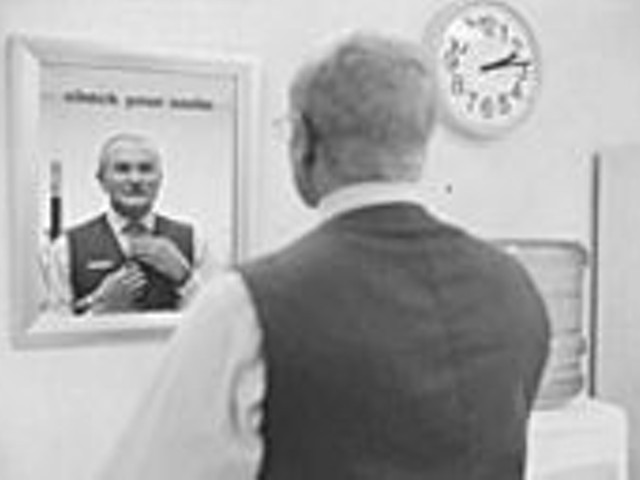Although at first blush this project appears to be yet another post-Quentin Tarantino and (blimey!) post-Guy Ritchie "hipster criminal" knockoff -- smells like Reservoir Blokes or Snatch THIS, Matey! -- Gangster No. 1 is a different beast altogether. An exploration of misguided youth and wasted adulthood, it's much less a trendy gangster story than a treatise on how several wrongs usually add up to an extremely large wrong. It's also a perfect opportunity for McDowell to pass his bludgeoning baton to up-and-comer Paul Bettany (Geoffrey Chaucer in A Knight's Tale, Russell Crowe's imaginary friend in A Beautiful Mind), whose leering menace and boundless ill-will make old Alex look less milk-bar hooligan than milquetoast.
Bettany and McDowell play the same character at different ages, a loose cannon only identified as Gangster 55. Much like Antonio Banderas in Assassins, Gangster has only one goal in his tiny, miserable life: to become "number one." Much of this refreshingly curt movie is concerned with Gangster's 1968 exploits under the tutelage of the suave kingpin Freddie Mays (a subtle and smart David Thewlis), and there's plenty of sass and slaughter to satisfy fans of the genre. However, our boy's no hero. When we first meet McDowell as the character in 1999, he turns straight to the camera's fish-eye lens and inquires of us, "What do you take me for, a cunt?" Once we learn his story, our response -- like those of his villainous peers -- can be nothing but unanimous.
In a dicey move that somehow works, McDowell narrates the tale of his hateful days in the Summer of Love, employing mock Cockney -- or, if you will, "Mockney" -- verbiage for local color. ("Shagpile and baby sham," he blurts in an introduction to a mod party scene, prompting amused shrugs from linguists.) Bettany's Gangster starts off as a two-bit mod, but he's swiftly consumed by the most vulgar aspects of ambition, becoming a classy legend in his own mind. "Arseholed on the smell of success," as it were, he covets Mays' Italian gray mohair suit, his ruby cufflinks, his wafer-thin Bond Street watch and, especially, the royal seat in Mays' groovy sunken living room. Whereas his contemporaries (Kenneth Cranham, Doug Allen, Razaaq Adoti) see a goodfellow in training, we see a pit viper waiting for its moment to strike.
Although the plot here is ostensibly about Gangster's self-absorbed climb at the expense of both Mays and Mays' ruthless adversary Lennie Taylor (Jamie Foreman), there's something deeper and far more harrowing at work. Gangster seethes with jealously over Mays' hottie moll, Karen (Saffron Burrows), and his loathing for the happy couple infects every scene. Watching him fetishize Mays' wardrobe, sneer with lecherous jealousy at Karen or swoon through the seeming rebirth of a heinous and very bloody ax murder, it's hard to avoid noticing Gangster's wicked homoerotic side. Frankly, it's creepy as hell, and Bettany commits himself to it completely, picking up where Fight Club turned cowardly, focusing his rage every time he commands his victims, "Look into my fucking eyes!"
We're never shown what went wrong with Gangster -- he can't even do crime sensibly -- but perhaps director Paul McGuigan (The Acid House) prefers to revel in the mystique amid all the funky period wallpaper and colloquial slang. The closest screenwriter Johnny Ferguson allows us to Gangster's icy soul is when the character clamors, "Nobody ever finks about me!" -- suggesting routine abandonment issues gone completely haywire. The flashy montage connecting 1970 to 1999 flits by swiftly, but if it were slowed down we'd probably see Gangster popping cassettes of Screaming for Vengeance and Appetite for Destruction into his car stereo.
Despite its leaden theme, Gangster No. 1 succeeds stylistically -- dig the ultra-close-ups, fragmented montages and smashing sound design by Simon Fisher Turner. It also packs a nasty sucker punch. Although you think you're watching just another in a series of British gangster films, you may suddenly realize that you're watching what is, thus far, the year's best horror movie.





